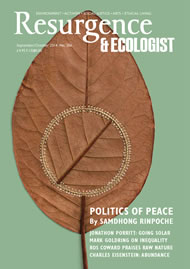Working with women in East, West and Southern Africa, I hear time and again the most compelling stories of how communities can regain control of their seeds, their livelihoods and their lives. When they begin to recognise how their communities, ecosystems and ancestral heritage have been unravelling, a deep sense of responsibility awakens, and an urgency to revive their former seed diversity, related knowledge, and biocultural practices, to ensure a beautiful future for the generations to come.
Without seed there is no food, no life. And it is women in most cultures who are traditionally the ...
There are approximately 848 more words in this article.
To read the rest of this article, please buy this issue, or join the Resurgence Trust. As a member you will receive access to the complete archive of magazines from May 1966.
If you are already a member, please Sign in






